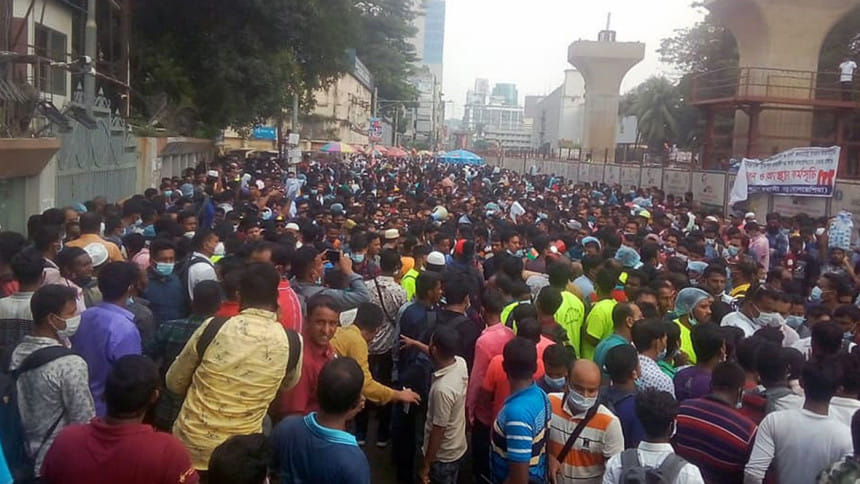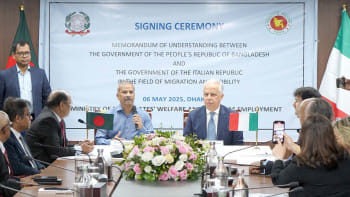Migrants’ crisis mishandled

The migrant workers' crisis, which emerged after the outbreak of novel coronavirus, further deepened with the government response marred by inappropriate decisions coupled with delayed and inadequate actions.
Thousands of migrant workers, mostly from Gulf countries, came home on holidays early this year and subsequently got stuck amid the pandemic.
The authorities concerned did not chalk out adequate plans to ensure that the workers return to the workplaces smoothly once normalcy returns.
As a result, a huge number of the workers with expired re-entry visas and residence permits endured untold sufferings when Saudi Arabia, the biggest labour market for Bangladesh, stopped automatic visa extension but resumed air communications.
They had to take to streets for plane tickets and extension of the tenure of visa and iqama (residency permit), forcing the authorities concerned to hold meetings to resolve the problems.
On the other hand, the government initiative, taken in April to provide special loan facilities to returning migrants who lost jobs abroad amid the pandemic, got delayed due to bureaucratic tangles at the expatriate welfare ministry.
Labour migration experts say the government lacked farsightedness in the absence of coordinated efforts between ministries and agencies.
The expatriates' welfare ministry could have played a pivotal role, they said and warned that migrant workers' crisis may deepen further if comprehensive steps are not taken, as more workers are expected to return to the country in coming months.
They suggested taking prior preparation and due steps ahead of full-fledged resumption of the international labour market and before destination countries resume hiring fresh Bangladeshi workers.
According to Brac Migration Programme, which cited data of immigration authorities at Hazrat Shahjalal International Airport and home ministry, about one lakh to 1.5 lakh expatriates came home between January and March this year before the pandemic.
Most of them were expecting to go back to their workplaces but they got stuck due to the Covid-19 pandemic.
When some countries resumed air communications with Bangladesh in mid-June, many workers found the visa validity and residence permits expired.
NO PROPER STRATEGY
"We knew that these people had to return. So why did we not have any proper strategy to deal with return migration?" prominent migration expert Prof CR Abrar told The Daily Star.
"Since our economy thrives on remittance, to what extent did we conduct the negotiation? To what extent there was policy coherence between ministries of civil aviation, expatriates' welfare and overseas employment and foreign affairs?"
He observed there was a "palpable lack of communication channel" to the migrants.
The government's decisions -- like making Covid-19 test mandatory for all out-going passengers irrespective of destination countries, and fixing Tk 3,500 as fee for such passengers -- were made on an ad hoc basis and without due plan and strategy, he noted.
As a result, he added, workers unnecessarily faced harassment and exploitation.
Hundreds of Saudi Arabia-bound migrant workers took to the streets in September when the Gulf country resumed air communications, demanding government steps to renew their re-entry visas and residence permits.
Earlier in July, Saudi Arabia approved three months' automatic extension of the validity of the expired iqama (residency permit) and exit and re-entry visas of expatriates staying outside the Kingdom.
Shariful Hasan, head of Brac Migration Programme, thinks a lack of data regarding stranded migrants, especially those who were expecting to return to Saudi Arabia, was an obstacle to dealing with the crisis.
"It would have been easier to make decisions if data on how many migrant workers came home on vacation and how many got stuck was prepared as early as in April," he told this newspaper.
Those who got stuck at home after coming on vacation suffered most as there was no discussion and plan on them, he added.
The government communicated with Saudi Arabia only after workers' visas and iqamas got expired, he said, adding, "Suffering [of workers] would have been less if we could do this earlier."
Migrant workers' contribution has been considered as one of the main pillars of the country's economy. Last year, the country received $18.3 billion in remittance sent by migrant workers, shows data from the Bureau of Manpower, Employment and Training (BMET).
More than one crore Bangladeshis live in over 160 countries.
Of all migrant workers making trips for jobs abroad since 1976 till last year, 76.93 percent went to six Gulf Cooperation Council countries -- Saudi Arabia, United Arab Emirates, Kuwait, Oman, Qatar, and Bahrain, says BMET data.
'COMPLEX' LOAN SCHEME
As the deadly virus continued to rage on, about 2.09 lakh Bangladeshi migrant workers, including 22,936 women, returned home between April 1 and October 18, according to data of expatriates' welfare ministry.
Most of them came home after losing jobs.
In order to support the returnees, Expatriates' Welfare Minister Imran Ahmad after an inter-ministerial meeting on April 5 announced a government decision to provide loan support to migrant workers for their reintegration.
The ministry created a Tk 200 crore fund after taking the money from Wage Earners' Welfare Board and prepared the "Guideline for reintegration loan for the Covid-19 affected migrant workers-2020" to disburse loan at 4 percent interest rate through Prabashi Kalyan Bank.
Initially, the loan scheme failed to draw workers' interest as the guideline was "complex", experts say.
The government later published a fresh guideline on September 17 with amendments to some clauses.
As per the previous guideline, a returnee needed to submit details of his or her one-year income and expenditure to get a loan for a project. This obligation has been removed.
Still there are some requirements that many returnees find difficult to fulfil.
For example, a returnee still has to submit documents of either owning or renting a property to get a loan of Tk 5 lakh if he or she wants to start a small-scale trade.
Probashi Kallyan Bank started disbursing the loan on September 21 and received about 400 applications as of October 13. Some 60 loan schemes worth a little over Tk 1 crore have been disbursed so far, said an official, seeking anonymity.
Brac Migration Programme head Shariful said the previous guideline was "complex and prepared without proper scrutiny" and that the guideline was amended following protest from migrant rights activists.
He said only giving loans to the poor migrants might not help them greatly. Many migrants had been in debt while they were also without income for the past seven to eight months.
Contacted, Md Shahidul Alam, additional secretary (administration wing) of expatriates' welfare ministry, said the expatriates' welfare ministry provided the Probashi Kalyan Bank with money while the bank being comparatively new lacked sufficient manpower for the loan management.
The loan disbursement initiative has got pace lately, he said, adding they made changes to the loan policy.
Commenting on the ministry's handling of the situation, Shahidul said the situation was brought under control "due to government actions".
Apart from holding more than a dozen inter-ministerial meetings, the expatriates' welfare minister personally wrote to different labour-receiving countries so that they take back the stranded migrants when opportunity arrives, he said.
WHAT STILL COULD BE DONE?
The experts suggested taking initiatives on the potential migrants who are facing a new problem after they were asked to resubmit documents for reissuing their visas, which expired amid the pandemic.
As Saudi Arabia will reissue 25,000 new visas, these potential workers have to do their medical tests again, collect fresh "police clearance" certificates, and get fresh approval from their prospective Saudi employers.
"Worryingly, many Saudi employers might not hire the workers amid post-Covid-19 economic situation which could create a new crisis," Shariful Hasan said.
A mechanism could be taken on how such workers get their money back if they fail to get jobs abroad, he said.
"Steps could be taken for 1 crore Bangladeshis who are abroad at present so that they do not have to return in large numbers."
If separate and comprehensive initiatives -- for those who are abroad, or waiting for new employment, and the returnees -- are taken and monitored properly, the problems could be resolved to a great extent, Shariful added.


 For all latest news, follow The Daily Star's Google News channel.
For all latest news, follow The Daily Star's Google News channel. 



Comments